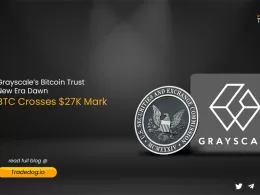Quick Links
The financial world is abuzz with excitement about BlackRock’s proposed spot Bitcoin ETF, which could be a game-changer for the crypto industry. As the world’s largest asset manager, with over $9 trillion under management, BlackRock’s entry into the Bitcoin space signifies a significant shift in the mainstream perception of cryptocurrencies.
What is a Bitcoin ETF?
A Bitcoin ETF (Exchange-Traded Fund) is a financial product that enables investors to gain exposure to Bitcoin’s price movements without owning the cryptocurrency itself. Functioning like traditional ETFs, it tracks the performance of Bitcoin as its underlying asset, allowing investors to buy shares or units of the fund, reflecting the cryptocurrency’s value. By investing in a Bitcoin ETF, individuals can access the potential benefits of Bitcoin’s price fluctuations within a regulated framework, bypassing the need for direct ownership of digital assets and simplifying participation in the crypto market through familiar investment avenues like stock exchanges.
Understanding BlackRock’s Bitcoin ETF
Unlike existing Bitcoin ETFs that track futures contracts, BlackRock’s ETF will invest directly in the underlying asset, Bitcoin. This means investors can gain exposure to Bitcoin’s price movements within a familiar and regulated framework. BlackRock has also recently redefined its spot Bitcoin ETF model, which will revolutionize the approach of traditional financial institutions like JPMorgan and Goldman Sachs towards engaging with Bitcoin. Central to this revamp is the introduction of the innovative “prepay” model, allowing financial institutions to create ETF shares using cash instead of directly holding Bitcoin. This strategic shift not only simplifies participation for major players but also redistributes risk from authorized participants to market makers, bolstering ETF stability.
Source: BlackRock
This model directly addresses a persistent concern of the U.S. Securities Exchange Commission (SEC) – the potential for market manipulation. BlackRock’s meticulous design aims to fortify investor protection, minimize transaction costs, and streamline operations, directly confronting long-standing SEC worries and potentially paving the way for regulatory approval.
Previously barred from direct cryptocurrency investments, traditional Wall Street banks now have the chance to act as authorized participants in BlackRock’s ETF. This opens a substantial opportunity for these banks to leverage their extensive balance sheets and engage as liquidity providers within the digital assets market.
The involvement of these major American banks, boasting trillion-dollar-plus balance sheets, is anticipated to notably elevate market dynamics as authorized participants. This shift holds the promise of diversifying liquidity sources, marking a pivotal moment in the cryptocurrency market’s progression.
Benefits and Opportunities
- Increased Accessibility: BlackRock’s ETF makes it easier and safer for mainstream investors to participate in the Bitcoin market. No longer will individuals need to navigate the complexities of setting up wallets or trading on crypto exchanges.
- Improved Liquidity: The ETF’s presence can increase the overall liquidity of the Bitcoin market, leading to smoother price movements and potentially lower volatility.
- Regulatory Clarity: The approval of BlackRock’s ETF could pave the way for further regulatory clarity in the crypto space, creating a more stable and predictable environment for investors.
- Institutional Interest: BlackRock’s involvement is a major signal of institutional confidence in Bitcoin, which could attract further investment from large financial institutions and pension funds.
Considerations and Challenges
- Regulatory Hurdles: The SEC’s historical stance presents a significant obstacle, with approval remaining uncertain despite recent developments.
- Market Volatility: Bitcoin’s inherent volatility poses risks for investors, necessitating caution amid price fluctuations.
- Limited Diversification: Solely investing in Bitcoin through the ETF could constrain portfolio diversification for investors seeking broader exposure.
Approval Prospects and Market Expectations
According to experts and market trends, a spot Bitcoin ETF holds a 90% chance of launching by January 2024. The recent US Court of Appeals’ resounding dismissal of the SEC’s complaints against a spot Bitcoin ETF suggests limited maneuverability for the agency. This unequivocal decision might pressure the SEC into a more favorable stance, indicating a probable breakthrough for the ETF’s approval.
Conclusion
BlackRock’s Bitcoin ETF represents a pivotal moment in the journey towards mainstream cryptocurrency adoption. While uncertainties loom, the potential benefits for investors and the crypto ecosystem are undeniable. As the industry evolves, staying informed remains paramount in making well-informed investment decisions.
BlackRock’s pursuit of a Bitcoin ETF reflects a transformative moment in crypto’s evolution. With potential benefits in accessibility and investment avenues, its approval could shape the future landscape of cryptocurrency investments. As the market eagerly awaits regulatory decisions, this development showcases the growing intersection of traditional finance and the burgeoning crypto space.









